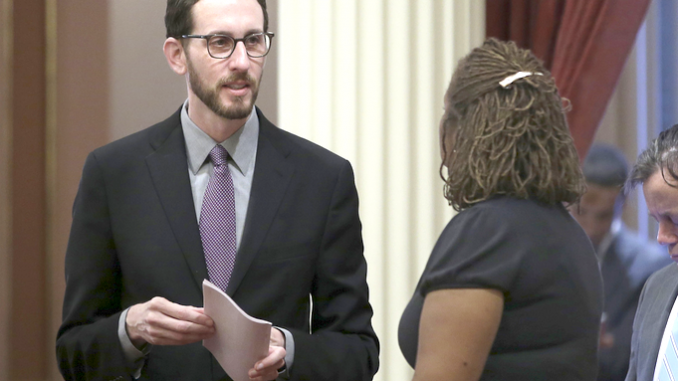
A controversial state senate bill that would have increased housing near public transit by allowing larger buildings that would have violated city ordinances won’t move forward this year after it failed to get out of committee today (April 17).
SB827, sponsored by Sen. Scott Wiener, D-San Francisco, died in the senate’s Transportation and Housing Committee. The bill was opposed by Palo Alto and Mountain View.
“While I’m disappointed that Senate Bill 827 won’t be moving forward this year, I’m heartened by the conversation it has started, both with those who support the bill and with critics of the bill,” Wiener said in a statement.
The bill would have provided “an incentive for housing developers to build near transit by exempting” them from maximum density limits, minimum parking requirements and restrictions on building heights.
Originally the bill would have allowed buildings up to 85 feet, but was changed last week so that the maximum height would have been 55 feet. Palo Alto’s maximum height is 50 feet.
Six senators voted against it, four voted in favor and three abstained.
Early this month and before the bill was amended April 9, opponents said it would take away power from local jurisdictions and communities by preventing them from participating in decisions regarding land use, zoning livability and sustainability while applying a one-size-fits-all strategy to the state’s housing shortage.
Opponents rallied April 3 in San Francisco to demand that city supervisors take a stance against it. Critics pointed out that the bill would result in a bonanza for developers, who could bypass local laws and build larger buildings without setting aside units for low-income residents.
“The passion we have seen around this bill is driven by what we are all feeling-that California’s housing costs are unsustainable and our housing policies aren’t working,” Wiener said.
“California needs to get at the heart of our housing shortage, not just work around the edges, or we will become a hollowed out state with no middle class,” Wiener added.
Laura Foote Clark, executive director of YIMBY Action, which supported the bill, said her group was disappointed by today’s vote, but added, “We are hopeful that this is going to come back in another form in the near future.”
Wiener did not say he thought the bill would fail rather he suspected it might take more than a year for the legislation to pass. Wiener compared the bill to legislation proposed by Gov. Jerry Brown in 2016 that aimed to streamline housing approvals.
That proposal paved the way for the success of Senate Bill 35, which Wiener also sponsored, and will streamline housing approvals.
Clark said of SB827, “A version of this bill will pass.”
Wiener said in the coming months he will be working to create a proposal for next year.
Fifteen bills aimed at alleviating the state’s housing crisis were signed into law by Brown in September. One of Palo Alto’s complaints is that the city needs time to adjust to all of those laws before dealing with SB 827.
The bills were meant to, among other things, reduce regulations, strengthen housing laws, boost construction and increase the number of granny units.
— By Bay City News




Glad to see SB827 die but these developers and “housing advocates” won’t give up until this place looks like Manhattan. I’m for new housing, but it should be located in appropriate places that won’t impact on existing residential neighborhoods. Decisions about where such housing should go are best made at the local level by people we elect, not the Legislature.
This bill was an attempt to deal with the displacement caused by skyrocketing rents. People are being driven out of our area because of a housing shortage that has made rents more expensive. $3,000/month for a studio in Palo Alto is ridiculous. If cities like Palo Alto are against this bill, then they need to step up and find a way to designate more places for housing developments. You can’t have it both ways.
You say it as if the “housing shortage” was a random storm that blew into the Bay Area. 50+ years of mass immigration supported by people like Wiener and his ilk is exactly what caused this problem. Native Palo Altans and other mid-Peninsula residents should suffer dehumanizing congestion and high-rises so Google and friends can hire cut-rate Indian programmers instead of Americans? Outrageous!
I’m disappointed. We need more homes near transit and overly restrictive cities are in the way.